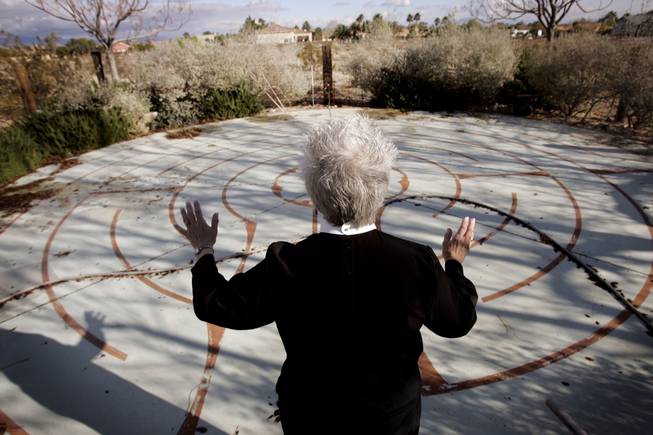
The Rev. Mary Bredlau stands in the labyrinth in the back yard of her North Las Vegas home.
Sunday, Jan. 9, 2011 | 2 a.m.
The Rev. Mary Bredlau has officiated at 350 to 500 funerals a year for 15 years. That’s 4,500 to 7,500 souls.
The teenagers are the hardest, especially the murders and suicides.
“To see the pain in the parents’ eyes, the despair and the shock in the other children’s eyes. Those are the most emotional,” she says.
At the end of a service, the funeral directors will usually invite mourners to come to the casket to say a final goodbye. “The teenagers come up, and they’re sobbing uncontrollably, and then they leave. But in about 60 seconds, they come back. They can’t leave. They return to the casket. It can’t be real. Those are the most despairing. And then what happens is that the next of kin, usually the parents, they wind up consoling the children.”
These families, she laments, are forever altered. “Things will never be the same.”
She’s done about 150 services like this.
For Bredlau, an Episcopal priest and former Roman Catholic nun, there’s nothing more important than this painful ministry.
“I have a great sense of awe. A sense of mystery. And amazement at what the human spirit can tolerate, and even in the midst of someone dying, in the midst of terribleness, it’s amazing what it calls forth from the person sitting in the dung heap, as well as the people around them. I don’t fear death now.”
But burying strangers and burying a loved one are different matters.
•••
Bredlau’s story begins among stoical Catholic Germans on a South Dakota farm. As a teenager, she was dating a nice boy, but he was Presbyterian. Her mother was peeling potatoes and told her daughter, “I would sure hate to walk down the aisle of a Presbyterian Church.”
Bredlau laughs at the memory: “OK. Got the message.”
She struggled with it, but believed she heard the call and entered the Mount St. Benedict Monastery before she was 18. Her head was shaved and she was given her new name: Sister Mary Esther.
After two years of liberal arts instruction at the convent, at the age of 20, she was assigned to teach at a parochial school in the migrant community of Asherton, Texas, 40 miles from the Mexican border. She was given 55 third- and fourth-graders in one classroom. She had no experience, no training, and no Spanish, but she loved the children, and began to wonder if she wanted her own.
It was just after the Second Vatican Council, when the church began to liberalize, or as Pope John XXIII put it, “... to throw open the windows of the church so that we can see out and the people can see in.”
For Bredlau, the changes were abstract, far away from her world, where the vow of silence resumed after the school day. “Things were changing, but not fast enough.”
She cried herself to sleep.
Her religious order moved her closer to home, but the urge to experience the world outside the convent didn’t abate, and she left the order in 1969. She still writes the sisters and sends money. “They’re an early part of my journey.”
•••
On a recent Saturday, Bredlau, who has spiky silver hair, stylish eyeglasses and a welcoming face, officiates at three funerals, beginning the day at Palm Mortuary on Eastern Avenue in the southeast valley, driving to a second service up north and ending it hours later at another Palm facility in the west valley.
She’s been a go-to chaplain for Palm Mortuary for years because of her knowledge of different ethnic and religious traditions, her prohibition against inappropriate proselytizing, and her understanding of the tremors of human suffering. She buries someone, and then years later the family will request her when another loved one dies.
She conducts funerals differently, depending on the deceased and the wishes of the family, although the process is similar. It begins in the days before the service with a call to loved ones to learn about the deceased. What was he like? What was your favorite thing to do together? She teases out the desires of the survivor if the deceased wasn’t specific about his wishes: Scripture or spiritual or secular reading? Music? Video remembrance? Who will speak? Occasionally, these calls turn into grief counseling sessions. Bredlau is a thanatologist, certified by the Association of Death Education and Counseling.
At a funeral, she explains what will happen during the service and speaks briefly about the deceased before proceeding. She speaks in direct, short sentences, and makes eye contact. At the memorial service on Eastern, the deceased is a man in his late middle age, although still young, and he is mourned deeply by family. Bredlau recites the Beatitudes, perhaps Christ’s most profoundly gentle teachings, and maybe for this reason often ignored or forgotten: Blessed are they who mourn, for they shall be comforted.
For mourners, death is always untimely. The next funeral, at the Palm location on Cheyenne, is for a woman in her 90s. Her family and friends weep. Her grandson plays an acoustic version of what is usually an upbeat tune but can also be a stirring funeral dirge, “When the Saints Go Marching In.”
Some say this world of trouble
Is the only one we need
But I’m waiting for that morning
When the new world is revealed
Bredlau is concerned about the third funeral. The deceased is a woman in her late 70s who has left a husband behind. Her family lives out of town, and their son worries whether his father can take care of himself. So often, Bredlau says, in a tone of both reverence and resignation, couples that have been together for decades wind up dying in close succession. Not uncommonly, she officiates at both funerals.
At this funeral, Bredlau believes she’s broken through some emotional dissonance for the right tone. It ends with the 1960s anthem “Aquarius.”
She has to be up at 5:30 Sunday morning for Mass at her church, Grace in the Desert Episcopal Church.
•••
After leaving the convent, Bredlau returned to Texas, to Our Lady of the Lake University, where she earned a bachelor’s degree.
“I was eager to head out in the world, with my degree in sociology, to change the world.”
Bredlau was part of a generation of American women — seekers, strivers, liberators — who have done more to change the country, indeed the world, than nearly any generation of Americans, men or women.
She came to Las Vegas to visit an aunt on an Easter break and returned later that year for good.
During the next decade she drew up the plans herself and built the house she still lives in, in the north valley. She married, had two children and then divorced. She became a working, single mother who would occasionally bring a homemade cake to the local firehouse.
There, she met her husband, Kurt Bredlau, the love of her life, in 1980.
He would later say that when he saw Mary, he knew two things: He could tell from the muscles in her upper arms that she was familiar with hard work. And he knew, he just knew, they were spiritually aligned.
They married in ’82.
He had been an instructor and manager of Arthur Murray Dance Studio, and they loved to dance. He played classical guitar. Kurt helped raise the children.
In addition to a long firefighting career, he was a Navy veteran, and although only a high school graduate, he educated himself, his bookshelves filled with history and politics. Her causes became his, as a book on the shelf showed: “The Feminine Face of God.”
Some years later, Bredlau saw an ad in a church bulletin for Nathan Adelson Hospice, seeking volunteers.
“I wasn’t sure how I would respond at hospice. What if I fall apart? But it was a natural for me,” she said, like a battlefield surgeon.
Within a year, she was the chaplain.
“To be present for people, however I could be, became awe-inspiring, sacred work. I’m not interested in pastoring at church. Or weddings. This is to the core. Human beings coming to grips with things — dealing with what’s really happening, and everything else really doesn’t matter.”
She loved working with the terminally ill and their families. In hospice, as in death, she discovered that a family’s true character would manifest itself, but in more intense ways. So a loving and caring family became more so, just as a dysfunctional family became more chaotic and callous.
In the end, she made many friends among hospice patients, but of course, they all died. It became too difficult, so she moved on to funerals, where she could comfort and counsel survivors and not have to live through her own grief day after day. She joined the Episcopal Church in 1993 and, after earning a graduate degree in ministry, was ordained a priest in September 1995.
Bredlau is a missionary deep into what she calls our “death denying” culture, bringing a sense of comfort, normalcy and sanctity to death, while recognizing how indifferent and absurd the universe can feel. She carries on a long tradition across religion and culture that proclaims respect for the dead as a precondition of civilization. Thucydides’ description of the plague of Athens in the “Peloponnesian War” is a vivid illustration of what it means when a society no longer cares for its dead: It is a society in shambles.
•••
In May, Petty Officer 2nd Class Felicia Tate of the Navy Honor Guard saw Bredlau. They know each other from countless military funerals. Tate quickly realized this is the funeral for Kurt Bredlau, a Navy veteran. She’s here to present the flag to the widow, Mary. Tate burst into tears. She recovered and asked if she can present the flag.
“I said, ‘Yes, on one condition: You say the words out loud. Everyone should hear them.’ ”
“She came over with the flag, knelt down, looked up at me, and I saw her eyes go weepy. I said, ‘You can do this. You can do this.’ I put my hand on her. She got through it.”
“Ma’am, on behalf of the president of the United States ...”
Kurt’s sickness had rolled through him. He was sick in March and dead in May. In between, there were 17 days at MountainView Hospital.
Cancer had wrapped around his colon; exploratory surgery found it in his liver, lymph nodes and other organs. Doctors wanted to send him to a rehab hospital before chemotherapy. But the cancer they found didn’t explain his severe back pain. Bredlau demanded a full bone scan. “I’m not signing any discharge papers,” she told them. Meanwhile, she was keeping ahead of his pain. If he said his pain level was a four out of 10, she knew better — he was stoic, and that if it wasn’t already seven or eight, it would be soon. She demanded more meds.
“If I accomplished nothing else in my years at hospice,” she says, her voice breaking for one of the few times in several hours of interviews, “at least I had the knowledge to speak up for him.”
On Kurt Bredlau’s fourth day at Nathan Adelson, and just moments after his son arrived in the room from the East Coast, he died. He was 72.
His funeral service was packed with more than 400 people. There were high school classmates, his firefighter chums, even the staff from his dentist’s office.
Bredlau didn’t officiate at the funeral, at her children’s insistence. This time she listened.
But she couldn’t resist using the occasion for a “teachable moment.”
She talked to those present about the kind people who had been at the previous night’s viewing. “They said they were sorry. They were shocked. I got a lot of hugs. But you know the best part? Not a single one gave me one of those stupid, unhelpful holy clichés. Like, God will never give you more than you can handle. Or, God needed another rose in Heaven.”
Always the minister, always the teacher, she says, ruefully, that at least people learned something that day. “Don’t give advice. Don’t say, ‘I know how you’re feeling.’ You don’t have a clue. All those insane things people tell other people who are hurting.”
A week after Kurt died, Palm Mortuary called, needing her for a service in the same room where the service for Kurt was held. “Is it a murder, suicide, teenager, baby?” she said of the circumstances. It was a woman in her 90s with a stolid German family. Bredlau agreed to officiate. And so, more funerals.
The unrelenting regimen of burying the dead and consoling the living has imposed structure and focus in her life as she grieves for Kurt.
“It’s the only thing in the past six months that hasn’t changed. I can go a few times a week and be with a family that needs me and be a help to them. I can make that go the way I want it to go,” she says.
Bredlau is trying to live the advice she’s been giving for so long.
“With grief, the first six months, you’re on autopilot. I can’t believe it’s been seven months.” For the grieving, that first period goes by in a flash, a dreadful if still somewhat dreamy prelude to a long, lonely future.
She acknowledges she’s struggling to follow the kind of counsel she gives to the grieving.
Bredlau reminds herself of men who grieve through anger: “If you stay angry and tight long enough, you won’t feel the pain.” Similarly, “If I do projects long enough, maybe I won’t feel lonely.”
If a person asks how she’s doing and she doesn’t know the person, she’ll say, “Doing the best I can.” If she knows the person well, she replies, “It sucks.”
In October her air conditioning went out. In December, a storm blew a hole in her roof. This month, a pipe broke, creating a pond in the backyard. “I told God this isn’t funny,” she says. “But he wasn’t paying attention.”
Her Christmas sermon at Grace in the Desert was about achieving inner peace, which she acknowledges she can’t seem to find these days.
Is she a better minister for her pain? It’s a vexed, almost irritating question, understandably. Her theology doesn’t allow human suffering to be some mysterious gift from God.
Bredlau had breast cancer in 2001, and after surgery she endured aggressive chemotherapy. “A well-meaning woman said to me, ‘Reverend, God gave you this cancer to make you more compassionate.’ I simply said to her, ‘I don’t believe a word of that.’ ”
“So yeah, I’m a better minister. But I don’t think this is his plan. It’s the human condition. We get illnesses. We die. God is holding that victim who just got shot. You believe what you want. That’s what I believe.”
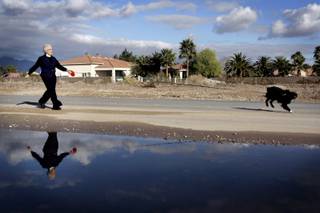
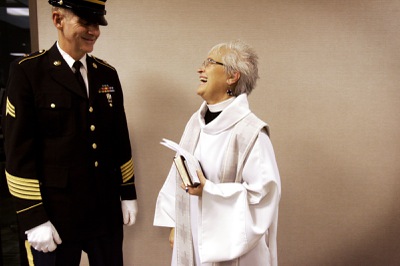
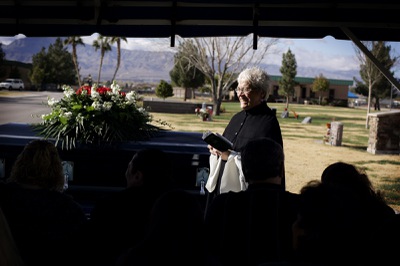
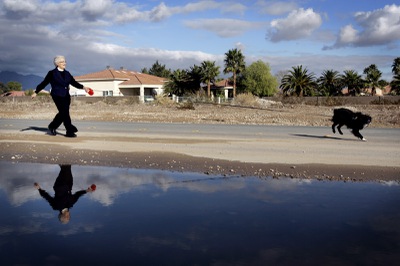

Join the Discussion:
Check this out for a full explanation of our conversion to the LiveFyre commenting system and instructions on how to sign up for an account.
Full comments policy